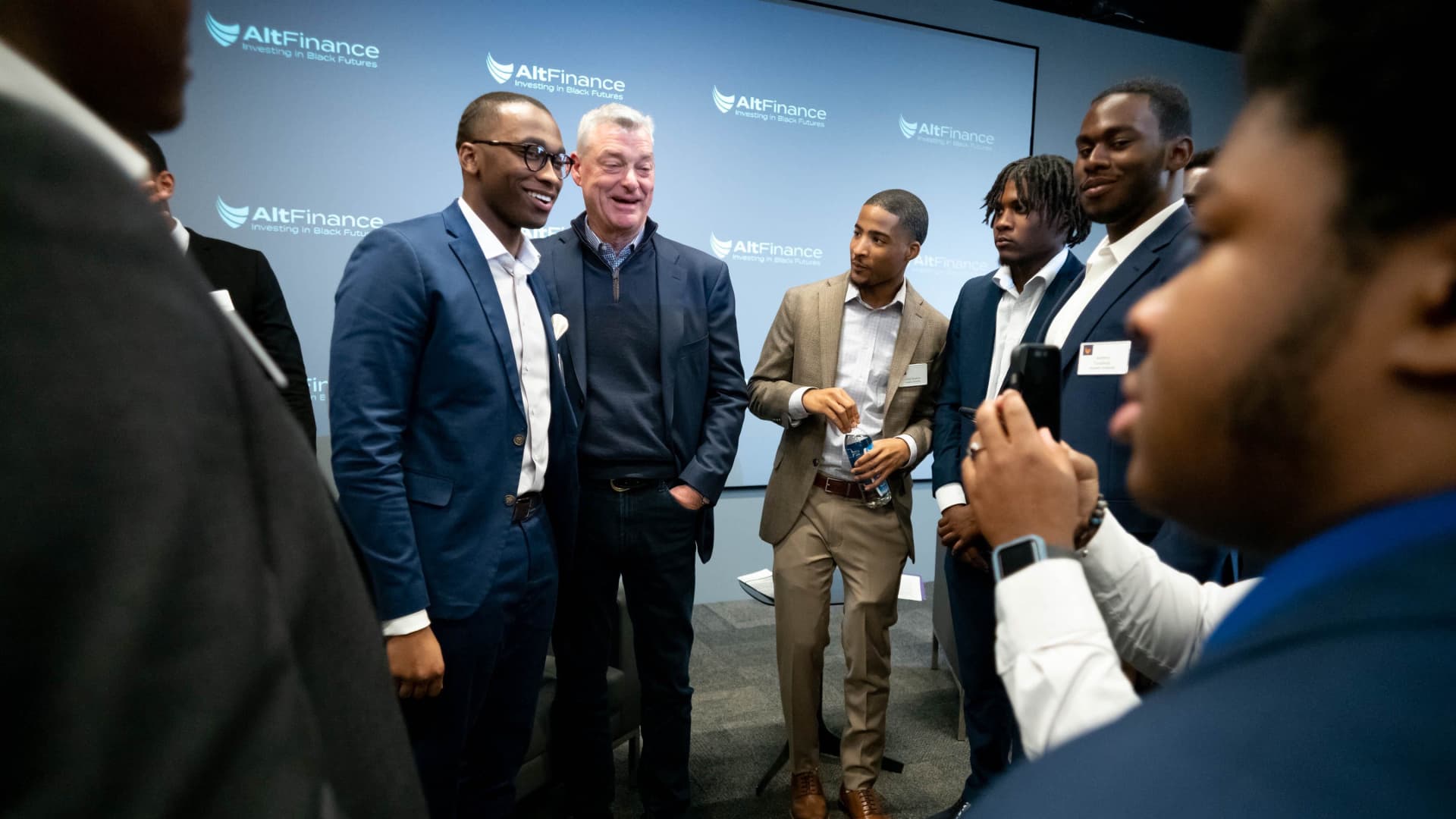HBCU students diversify alternative investing with the help of Wall Street’s biggest firms

Antony Ressler, co-founder of Ares Management, takes photos with students of the AltFinance Fellowship.
Marcus Shaw, AltFinance
The search for bigger profits and top talent is nothing new on Wall Street, but some firms are turning to an almost untapped resource: historically Black colleges and universities, or HBCUs.
The AltFinance Fellowship is the brainchild of top alternative investment firms Ares Management, Apollo Global Management and Oaktree Capital Management. The three firms are investing $90 million over 10 years into the program, which is providing more than 100 students at HBCUs with paid experience, mentorship and networking opportunities.
Selected students will also receive a scholarship of up to $10,000 if they’re sophomores, while juniors and seniors can receive up to $15,000. Partnering schools include Clark Atlanta University, Howard University, Morehouse College and Spelman College.
The program aims to give students of color an opportunity in a booming industry that hasn’t been the most diverse. The private equity, private credit and commercial real estate industry has about $10 trillion in assets under management, according to data provider Preqin. Meanwhile, in 2020, Black people accounted for 1% to 2% of the investment deal teams in the private equity space, according to management consulting firm McKinsey.
“This is not a charitable activity,” Howard Marks, co-chairman of Oaktree Capital Management, told CNBC. “I think it has some socially beneficial aspects to it. But that’s not the only reason we’re doing it. We’re also doing it because we believe it can enrich our organizations.”
Indeed, chief investment officers of leading institutional investors said they would allocate 2.6 times as much capital toward more ethnically and racially diverse private-equity deal teams if they were choosing between two comparable firms, according to a 2022 report from McKinsey.
An opportunity to build wealth
Marc Rowan, CEO of Apollo Global Management, and Marcus Shaw, CEO of AltFinance
AltFinance is also giving students an opportunity to enrich themselves. Alternative investing has boomed since 2000 following the dot-com bubble, according to Preqin. Further, employee compensation in the industry can be lucrative, even as new graduates embark on their careers.
In 2020, the average base salary for associates — an entry-level position — at private equity firms was $137,000, according to data from executive search company Heidrick & Struggles.
“It’s the potential to grow generational wealth,” Howard University sophomore Brittany Clark told CNBC, “Personally, from my background making six figures out of college is unheard of, so when I talk about it with my parents it’s shocking.”
“Coming from humble beginnings myself, I didn’t know much about alternatives or finance or the jobs and opportunities that are available to me.” said Morehouse College senior Joseph Ramirez. “Now, I’m learning the tools necessary to be able to create generational wealth.”
AltFinance CEO Marcus Shaw said the program’s potential impact goes beyond Wall Street.
“The students that we have in our program were destined for greatness, no matter what path they were going to take.” Shaw told CNBC. “But by giving them an opportunity to look behind the veil and see what lies ahead of them in the career in alternative investments, [it] creates another opportunity for them to build wealth for themselves, their family and their communities. There is a trickle-down effect… that will not only create stronger families for them but stronger communities.”
Ares Management co-founder Antony Ressler and Apollo Global Management CEO Marc Rowan both said the fellowship has the potential to increase representation in the industry in the near term and profits for the firms in the long term.
“We are a culture of finding that which is not well understood,” Rowan told CNBC. “And increasingly that comes from having diverse points of view at the table, and diverse backgrounds and diverse ways of looking at things and then diverse ability to develop [and] deliver a message to a diverse set of clients.”
“The more perspectives you have, the better the investor you are.” Ressler told CNBC. “So the idea of being a more diverse company, for us is a positive. It’s good for business. It’s good for our investment decisions. It’s good for our employee base. And it’s precisely what we think we should be doing.”









